The Washburn Parallaxe PXL20EWH-D in Gloss White Blends Classic Style with Modern Performance.
It’s Sleek, Powerful, and Built for Players Who Want Precision, Speed, and Reliability in one Striking Single-cut Design.
Whether You’re Riffing or Tearing into Solos, this Guitar Delivers Clean Looks, Tight Tone, and Rock-Solid Playability. Read on
This Post May Contain Affiliate Links
In compliance with the FTC guidelines, please assume that some of the links on these posts and sites are affiliate links (Amazon or others) from which I may earn a small compensation/commission from sales of certain items at no extra cost to you from qualifying purchases.
Anytime you see a link that looks like “astore.com, paid link, #ad, #CommissionsEarned or Amazon/Amazon.com/ca,”… it can be assumed that it is an affiliate link.
To learn more, follow the link below.
The Washburn Parallaxe
Logo of The Washburn brand- Image courtesy of Wikimedia and is in the public domain.
Washburn is an American manufacturer of string instruments established in 1883 in Chicago, Illinois.
Along with repairing and manufacturing instruments for other retailers and distributors under various house brands, the Company created a line of fretted instruments under the “George Washburn” name, making …
- Guitars, Mandolins
- Banjos and Ukuleles
By 1892, the Company dominated the domestic string instrument marketplace. By 1898, Washburn Guitars had a line of 28 models.
The company continued to change designs to accommodate its growing demands and the need to outsource the construction of some models.
Washburn And The First Dreadnought Guitar
Many consider Washburn’s Lakeside Jumbo Acoustic Guitar, released in 1912, to be the first Dreadnought-sized guitar.
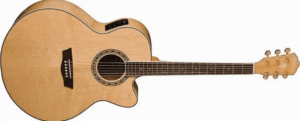
A Modern Day Washburn Dreadnought Heritage 40 Series WJ40SCE Acoustic-Electric Guitar – Image courtesy of Reverb
Dreadnoughts were a name given to prominent larger body guitars in the early 1900s, a metaphor for the extra size and named after a British Battleship, the HMS Dreadnought from WW1.
Updated versions are still available today.
Competition & Decline
By the 1920s, the guitar portion of the business was sold to Tonk Brothers.
In 1928, Tonk Brothers purchased a massive factory with Jr Stewart Company but went bankrupt in 1930.
The assets acquired by the Regal Musical Instrument Company were used to reopen the Washburn factory and see it decline to nothing in 1940.
Resurrecting The Washburn Brand
Tom Beckman and his wife started a wholesale music business in Los Angeles named Beckmen Musical Instruments in 1972, and it was here that the Washburn brand was resurrected, only to change hands again in 1977 with Fretted Industries Inc., who acquired the Company and returned manufacturing back to Chicago.
In 1987, Fretted Industries Inc. changed its name to Washburn International, opening manufacturing in 1991 for instruments that were…
- Higher-end
- Had Shorter runs &
- Creating One-offs as well as prototyping
This placed the Washburn brand among the top 3 Guitar manufacturers worldwide, behind Fender and Gibson.
First Electric Guitars By Washburn
From 1978 to 1984, Washburn produced its first electric guitars, the Wing Series Models, which featured innovative…
- Push-pull split humbuckers
- Brass hardware &
- Neck-Through construction (More on this later)
As of 2017, production primarily shifted from Korea to factories in Indonesia and China.
Innovations
Washburn is no stranger to innovation, and going into the 20th century, the Guitar Company continues to lead with instruments, amplifiers, accessories and several licensed guitar construction features like the…
- Buzz Feiten Tuning System or BFTS &
- The Stephens Extended Cutaway or SEC design
The Buzz Feiten Tuning System
It is a tuning system first used by Washburn from 1995 to 2010 and became a standard on US-made Guitars, Basses, and Imports.
The BFTS is a corrected tuning process that uses a “Shelf nut” and “Saddle adjustments” to minimize intonation problems created by Western tuning.
The Stephen’s Extended Cutaway
Developed by Luthier Stephen Davies in collaboration with Nuno Bettencourt, the SEC is an enhanced Bolt-On Neck Joint and cutaway with a “Heel-Less Design,” allowing easier unobstructed hand access to higher neck regions.
(See Image)

The Washburn N4 Vintage with the SEC design – Image has been released into the public domain and is courtesy of Wikimedia & Author ZeGlobox.
What Is A Bolt-On-Neck Construction
Bolt-On is identified by turning your instrument over and seeing a metal plate at the junction between the guitar body and neck.
You generally have 4 screws to indicate where the two are bolted together. (See Image)
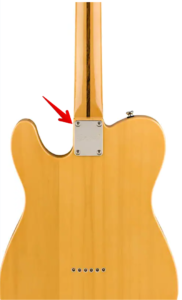
A Squier by Fender 50’s Telecaster w/Maple neck Butterscotch Blonde Finish and Bolt-On Neck- Tap Image to see more- courtesy of Amazon.
Pros & Cons Of A Bolt-On Neck Construction
Pros
- More common, cost-effective and accessible for the manufacturing and repair process
- Easy to replace or customize with different fretboards on your guitar
Cons
- It offers less sustain or resonance between the neck and the body
- Because of the heel that is created, reaching higher frets can sometimes be more challenging to execute
- Not the best-looking
With the SEC design, the cons are minimized due to removing the “Heel” while maintaining the benefits of a bolt-on neck.
The Parallaxe can meet the demands of most rock shredders, ensuring performance, playability, and comfort, bringing you to a new level.
Tech Specs
Body
- Body Wood Material – Mahogany
- Body Style Type – Solid Single Cutaway
- Hand Orientation – Right
- Weight – 5.04 kg
- Finish – Gloss w/Black Binding On Body & Headstock
- Model Number – PXL20EWH-D-U
- Country of Origin – Indonesia but Imported from the US
- Neck Wood – Mahogany
- Fretboard Wood – Ebony
- Neck Profile – “C” shape
- Neck Construction – Set Neck w/Stephens Extended Cutaway-inspired design. (See Image)
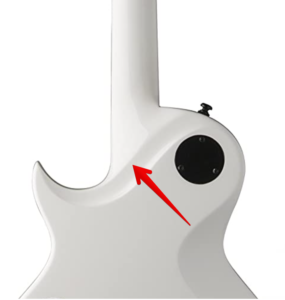
An image of the set neck construction and a Stephens Extended Cutaway-inspired design allows for high neck access without adjusting the hand position. Image courtesy of Amazon.
- Fretboard Inlays – Split Pearl Blocks
- Fret – 22 Jumbo
- Scale Length – 24.75″
- Nut Material – Graphite
- Nut Width – 43mm
- Tuners – Black Locking Grover Exclusive 18:1
- Buzz Feiten Tuning System
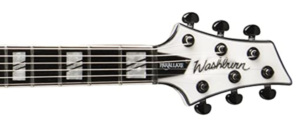
The Washburn Parallaxe w/Block Inlays-Grover Exclusive 18:1 Tuners, & binding on headstock -Image courtesy of Amazon
What Is A Set Neck or Set In Neck Construction
The Set-in Neck is where the guitar neck is glued to the guitar’s body.
This method has existed for many years and is the standard practice for attaching necks to acoustic guitars.
Is A Set Neck Better Than A Bolt-On?
Pros
- Set Neck guitars give you more sustain and resonance
- No heels, like with a bolt-on, provide a cleaner look
- Effortless playability in the higher regions of the fretboard without having to adjust your hand position
Cons
- Because of the construction design and material, the glue waiting time is greater than the bolt-on process, affecting production and costs
- Not easily replaced if you experience neck issues this will need to be left to experience Luthiers.
While each neck construction design has pros and cons, to say whether one is better than the other must be up to the player.
- Controls – 2 Volume / 1 Tone
- Pickup Selector – 3-way toggle
- Black Hardware
- Bridge – Tune-O-Matic w/Sustain plate
How Do You Know If Pickups Are Active Or Passive?
The easiest way to tell is to check to see if there is a battery compartment.
Active pickups use 9V batteries, so if the guitar comes with a compartment, it is active. (See Image below)
Should You Get Active Pickups?
Pros
- Active Pickups Give you more power in your sound and a more consistent tone than passive
Cons
- You cannot get sound with active pickups if the battery is out or spent, so staying on top of your battery’s life is needed
More FAQ’s
The Washburn Parallaxe PXL 20 On Video
Final Thoughts

Like any brand, Washburn offers a mix of higher and lower-quality guitars.
However, even the lower-end instruments have good-quality parts, making them better than most other guitars in their category.
I own and play a stripped-down version of this instrument, the PXL10EC Parallaxe Singlecut Carbon Black.
It has the same power station body, neck and fretboard, so I know how this guitar feels and plays.
I have had some intonation issues along with volume and tone knobs that needed fixing.
My other comment is that this Made-in-Indonesia instrument is a bit pricey, costing $849.00-$1515.90 USD or more.
Should You Get This For Your Collection?
I was a straight-off fan, with the lightweight, jumbo frets, tone and playability.
They say that when it comes to pickups, they find you, and this is true in my case; this guitar sold me on EMG Active pickups, and I have been a fan ever since.
With my music and recording, this guitar has exceeded expectations. It is versatile enough to perform multiple genres but still fills a room when you need the power.
So, YES, add one of these to your collection, but look around for the best price.
Did You Like This Article?
Want to hear more about the Active EMG 81/85 Humbucking Pickups?
Check out my review of the Gibson Zakk Wylde Signature Les Paul.
Also…
I would like to hear your comments in the section below. Please feel free to let me know if you would like me to review a favourite guitar.
As always, stay the course and keep playing.
Image of guitar front and back courtesy of Amazon
Photo in CTA courtesy of Amazon
Final thoughts AI-generated images courtesy of Co-pilot

Starting A Journey At 7 Years Of Age, The Love For The Guitar Only Became Stronger Going Into My Teens. This Leading To An Exciting Time Of Teaching, Performing, And Recording. Join Me Now As We Can Bring The Love Of This Instrument To Other Musicians Globally.
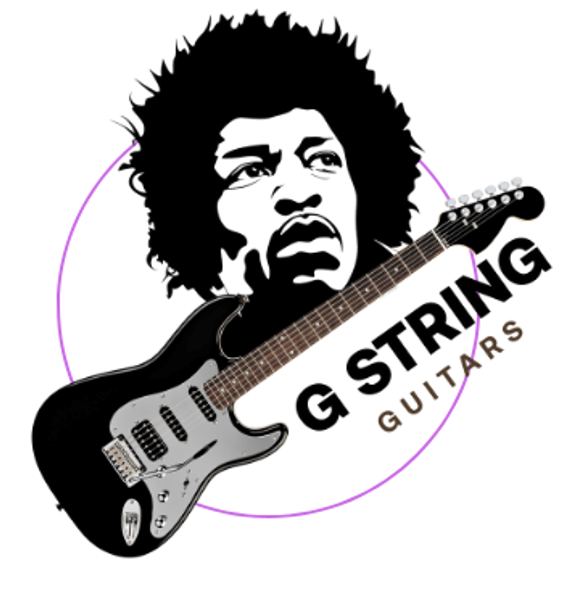
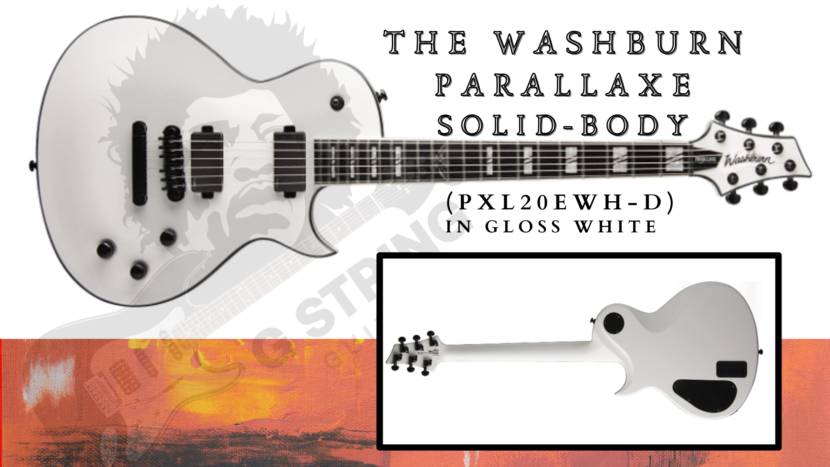
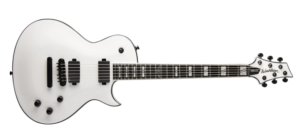
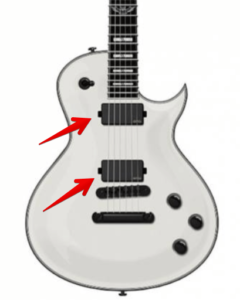
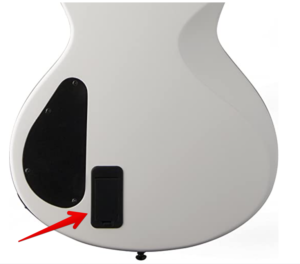
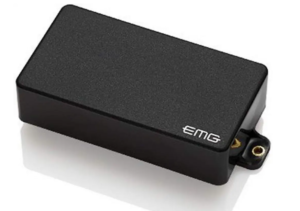

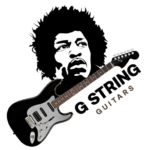
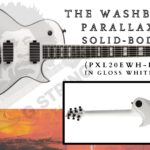
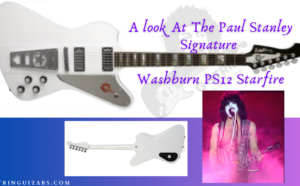


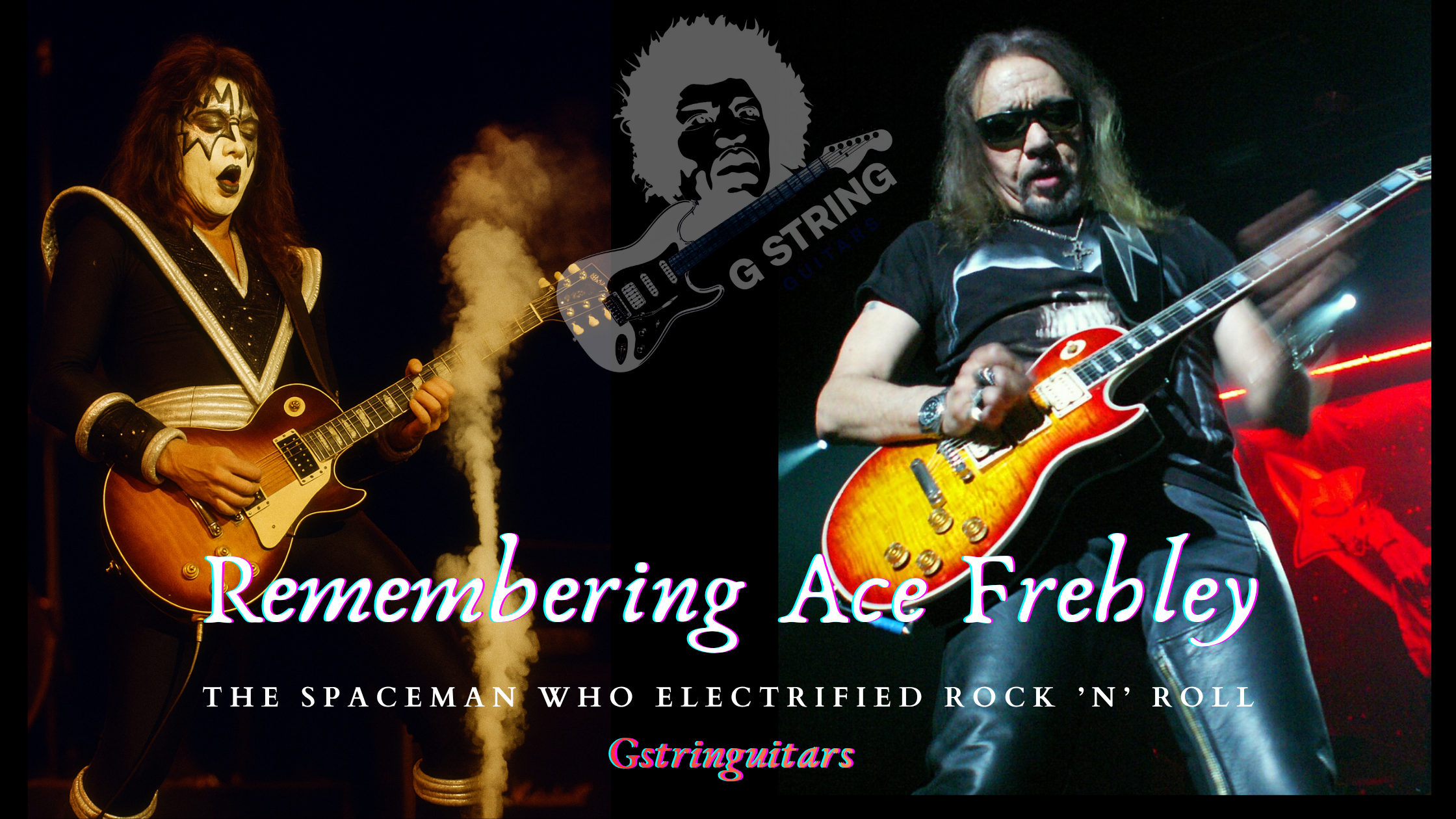
It was really interesting to read the history of Washburn and all the ups and downs. Can’t believe that its been going since 1883. It can’t be easy to make it as a huge company in such a specialized field.
The Washburn Parallaxe sounds great and even looks the part and I see that many professional artists love the Washburn brand. As a beginner though I would go for more affordable options.
Hello, Michel, and thank you for your visit and for leaving your feedback on the post.
I am glad you found value in this. Yes, there are more affordable instruments, but like anything else, as your skills grow, so will your interest in your guitars.
You will start to like specific options and get more personal about your guitar’s features; this is entirely normal. One of my first instruments was the Washburn parallax but not this model. Still to this day, I love this guitar; it truly fills a room, but the intonation is tricky to get right.
Thank you again, and do not hesitate to read some of the other posts.